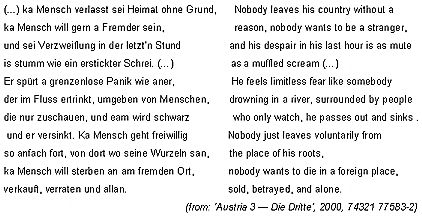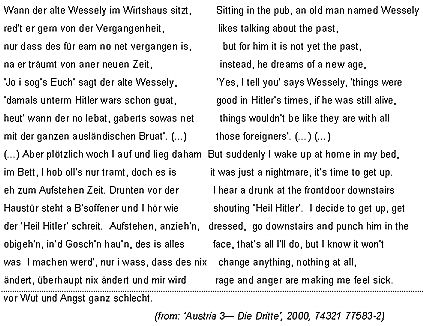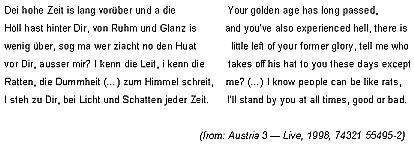
Christian
Karner (2002) ''Austro-Pop' since the 1980s: Two Case
Studies of Cultural Critique and Counter-hegemonic
Resistance'
Sociological Research Online,
vol. 6, no. 4,
<http://www.socresonline.org.uk/6/4/karner.html>
To cite articles published in Sociological Research Online, please reference the above information and include paragraph numbers if necessary
Received: 29/10/2001 Accepted: 22/2/2002 Published: 28/02/2002
 Abstract
Abstract Introduction
Introduction Theoretical background
Theoretical background
'Discourses, sign-systems and signifying practices of all kinds, from film and television to fiction and the languages of natural science produce effects, shape forms of consciousness and unconsciousness, which are closely related to the maintenance or transformation of our existing systems of power.' (Eagleton 1996, 183)
 The case studies and
their context
The case studies and
their context
'Besides leading to the formation of a standardised music reflecting Anglo-American culture, [transculturation] also includes the catalytic influence this imported culture has in generating a thriving indigenous music scene.' (Collins 1992, 186)
 STS: Fürstenfeld,
Auschwitz and back
STS: Fürstenfeld,
Auschwitz and back





 Austria 3's (ambivalent?)
politics
Austria 3's (ambivalent?)
politics

(from: 'Und alles ist ganz anders wordn', 1981, 521 780-2)




 Fragmented Individuals
and their Identities
Fragmented Individuals
and their Identities

'Mass culture [constitutes] contested terrain (…) where ideological struggle — the struggle over the power to define — takes place. (…) [While] the forces arrayed in support of the existing hegemony are formidable, there are also numerous instances where mass culture issues serious challenges to hegemonic power.' (Garofalo 1992, 2)
 Concluding remarks
Concluding remarks
 Notes
Notes2Both bands look back at long and successful musical careers. While there are currently ten STS albums available, Austria 3 have released three joint albums to date (drawing on numerous — individually released — previous ones). The rationale underlying my selection of songs for analysis in this article was to identify texts of relatively clear ideological intent in the context of the aforementioned 'points of crisis'. As will be mentioned in due course, however, the 'successful ideological articulation' of these (or indeed any other) cultural texts cannot be assumed but requires empirical investigation.
3Proporz refers to 'the dividing up of all posts in the public sector between nominees of right and left' (Brook-Shepherd 1997, 385).
4I here follow Felix Kreissler's definition of Vergangenheitsbewältigung as a process of analysing Austrian history 'without self-pity' and a growing awareness of the role played by Austrian perpetrators and victims of the Holocaust. Such a historical consciousness is to replace widespread claims not to have been aware of the systematic annihilation of millions of people during WW II (Kreissler 1987, 131).
5Given the highly colloquial nature of most songs within the 'Austro-Pop' genre, literal translations would fail to capture the moods of the songs. All my translations are therefore 'rough' insofar as they aim to reflect the general content rather than presenting exact dictionary equivalents. I have also transcribed all songs in their Austrian-German vernacular, instead of misrepresenting them through translations into 'official' or 'high' German.
6The Jewish cemeteries in Vienna and Eisenstadt were vandalised in October 1991 and November 1992. Starting in December 1993, a series of letter-bomb attacks — killing four and injuring ten people — were committed against members of ethnic minorities as well as against people/organisations supporting them (also see Haslinger 1995). The most widely documented case resulted in Helmut Zilk's — Vienna's (social democrat) mayor at the time — loss of a hand.
7Richard Mitten has attempted a summary of the various meanings of the term Gemütlichkeit as 'that nearly untranslatable Germanic cultural something so inadequately captured by the English conviviality or atmosphere' (Mitten 1992, 3). He may have added 'cosiness' or 'relaxation' as further connotations.
 Musical References
Musical ReferencesAustria 3, 'I bin a Knierer', Austria 3 Live, BMG. 74321 55495-2. 1998.
Austria 3, 'A erstickter Schrei', Austria 3 — Die Dritte, BMG. 74321 77583- 2. 2000.
Austria 3, 'Der alte Wessely', Austria 3 — Die Dritte, BMG. 74321 77583-2. 2000.
Rainhard Fendrich, 'Razzia', Und alles ist ganz anders word'n, Polygram. 521 780-2. 1981.
STS, 'Fürstenfeld', Überdosis G'fühl, Polygram. 821 796-2. 1984.
STS, 'Kalt und Kälter', Grenzenlos, Polygram. 827 448-2. 1985.
STS, 'Irgendwann bleib i dann dort', Grenzenlos, Polygram. 827 448-2. 1985.
STS, 'Die Kinder san dran', Auf Tour, amadeo. 837 553-2. 1988.
STS, 'I mag das Land', Auf Tour, amadeo. 837 554-2. 1988.
STS, 'Das sind die Tag', Auf a Wort, amadeo. 511 428-2. 1992.
STS, 'Es fangt genauso an', Auf a Wort, amadeo. 511 428-2. 1992.
STS, 'Und es is so schön da', Auf a Wort, amadeo. 511 428-2. 1992.
STS, 'Wo san all die Menschen hin?', Auf a Wort, amadeo. 511 428-2. 1992.
STS, 'I bin aus Österreich', STS & Band Live, amadeo. 157 829-2. 2000.
 Relevant Internet
Material
Relevant Internet
MaterialAustria's four main political parties:
<http://www.fpoe.at>
<http://www.gruene.at>
<http://www.oevp.at>
<http://www.spoe.at>
![]()
AICHINGER, I. Hilfsstelle, in Fliedl, K. (editor) (1998) Das andere Österreich, München: dtv.
ANDERSON, B. (1983) Imagined Communities, London: Verso.
ANG, I. (1996) Living Room Wars: Rethinking Media Audiences for a Postmodern World, London: Routledge.
AUGOUSTINOS, M. Social representations and ideology: towards the study of ideological representations, in Flick, U. (editor) (1998) The Psychology of the Social, Cambridge: University Press, pp. 156—169.
BALLANTINE, C. (1984) Music and its Social Meanings, New York: Gordon and Breach.
BATTAGLIA, D. Towards an Ethics of the Open Subject, in Moore, H.L. (editor) (1999) Anthropological Theory Today, Cambridge: Polity Press.
BOEHMER, K. Sociology of music, in Sadie, S. (editor) (1980) The New Grove Dictionary of Music and Musicians, London: Macmillan.
BRACE, T. and Friedlander, P. Rock and Roll and the New Long March: Popular Music, Cultural Identity and Political Opposition in the People's Republic of China, in: Garofalo, R. (editor) (1992) Rockin' the Boat: Mass Music and Mass Movements, Boston: South End Press.
BROOK-SHEPHERD, G. (1997) The Austrians, London: HarperCollins.
COLLINS, J. Some Anti-Hegemonic Aspects of African Popular Music, in Garofalo, R. (editor) (1992) Rockin' the Boat: Mass Music and Mass Movements, Boston: South End Press.
EAGLETON, T. (1996) Literary Theory, Oxford: Blackwell.
FAIRCLOUGH, N. (1989) Language and Power, London: Longman.
FISKE, J. (1987) Television Culture, London: Methuen.
FITZMAURICE, J. (1991) Austrian Politics and Society Today, London: Macmillan.
FLIEDL, K. Eins nach dem anderen, in Fliedl, K. (editor) (1998) Das andere Österreich, München: dtv.
FRITH, S. (editor) (1991) World Music, Politics and Social Change, Manchester: Manchester University Press.
FRITH, S. Towards an Aesthetic of Popular Music, in Leppert, R. and McClary (editors) (1996) Music and Society: The Politics of Composition, Performance and Reception, Cambridge: University Press.
GAROFALO, R. Introduction, in Garofalo, R. (editor) (1992) Rockin' the Boat: Mass Music and Mass Movements, Boston: South End Press.
HACKL, E. Herr Meisel und seine Söhne, in Fliedl, K. (editor) (1998) Das andere Österreich, München: dtv.
HALL, S. Encoding/Decoding, in S. Hall et al. (editors) (1980) Culture, Media, Language, London: Hutchinson.
HALL, S. Introduction: Who Needs Identity? in Hall, S. and duGay, P. (editors) (1996) Questions of Cultural Identity, London: Sage Publications.
HANDKE, P. (1972) Wunschloses Unglück, Salzburg: Residenz.
HARRÉ, R. The epistemology of social representations, in Flick, U. (editor) (1998) The Psychology of the Social, Cambridge: University Press, pp. 129—137.
HASLINGER, J. (1995) Politik der Gefühle, Frankfurt: Fischer.
HAUER, N. NS-Trauma und kein Ende, in A. Pelinka, E. Weinzierl (editors (1987) Das Grosse Tabu: Österreichs Umgang mit seiner Vergangenheit, Verlag der Österreichischen Staatsdruckerei: Edition S, pp. 28—41.
JELINEK, E. (1985) Die Ausgesperrten, Reinbek: Rowohlt.
KREISSLER,F. Nationswerdung und Trauerarbeit, in A. Pelinka, E. Weinzierl (editors) (1987) Das Grosse Tabu: Österreichs Umgang mit seiner Vergangenheit, Verlag der Österreichischen Staatsdruckerei: Edition S, pp. 127—142.
LAKOFF, G. (1987) Women, Fire, and Dangerous Things, Chicago: University of Chicago Press.
LANGBEIN, H. Darf man vergessen? in A. Pelinka, E. Weinzierl (editors) (1987) Das Grosse Tabu: Österreichs Umgang mit seiner Vergangenheit, Verlag der Österreichischen Staatsdruckerei: Edition S, pp. 8—16.
LEWIS, G.H. Don' Go Down Waikiki: Social Protest and Popular Music in Hawaii, in Garofalo, R. (editor) (1992) Rockin' the Boat: Mass Music and Mass Movements, Boston: South End Press.
MARSHALL, H. Discourse analysis in an occupational context, in C. Cassell, G. Symon (editors) (1994) Qualitative Methods in Organizational Research, London: Sage Publications, pp.91—106.
MARTIN, P. (1995) Sounds and society: Themes in the sociology of music, Manchester: Manchester University Press.
MCCRONE, D (1998) The Sociology of Nationalism, London: Routledge.
MENASSE, R. (2000) Erklär mir Österrreich, Frankfurt: Suhrkamp.
MITTEN, R. (1992) The Politics of Antisemitic Prejudice: The Waldheim Phenomenon in Austria, Oxford: Westview Press.
MORLEY, D. (1980) The 'Nationwide' Audience, London: British Film Institute.
PELINKA, A. and WEINZIERL, E. Vorwort, in A. Pelinka, E. Weinzierl (editors) (1987) Das Grosse Tabu: Österreichs Umgang mit seiner Vergangenheit, Verlag der Österreichischen Staatsdruckerei: Edition S, p.7.
PELINKA, A. Die rechte Versuchung, in Scharsach, H. (editor) (2000), Haider — Österreich und die rechte Versuchung, Reinbek: Rowohlt, pp. 46-66.
POTTER, J. and Wetherell, M. Social representations, discourse analysis, and racism, in Flick, U. (editor) (1998) The Psychology of the Social, Cambridge: University Press, pp. 138-155.
RAUSCHER, H. Eine geschlossene Verdrängungskette, in Scharsach, H. (editor) (2000) Haider— Österreich und die rechte Vesuchung, Reinbek: Rowohlt, pp.22-45.
ROTH, G. (1996) Das doppelköpfige Österreich, Frankfurt: Fischer.
SAVILLE, M. (1999) 'Das geliebte, genauso gehasste Österreich': The Theme of Austria in the Plays of Thomas Bernhard, PhD Thesis: University of Nottingham.
SHEPHERD, J. (1991) Music as Social Text, Cambridge: Polity.
STREET, J. Youth Culture and the Emergence of Popular Music, in T. Gourvish, A, O'Day (editors) (1991) Britain Since 1945, London: MacMillan.
SULLY, M. (1990), A Contemporary History of Austria, London: Routledge.
SZEMERE, A. 'I Get Frightened Of My Voice': On Avant-Garde Rock in Hungary, in Frith, S. (editor) (1991) World Music, Politics and Social Change, Manchester: Manchester University Press.
SZEMERE, A. The Politics of Marginality: A Rock Musical Subculture in Socialist Hungary in the Early 1980s, in Garofalo, R. (editor) (1992) Rockin' the Boat: Mass Music and Mass Movements, Boston: South End Press.
TURRINI, P. (2001) Ich liebe dieses Land, Frankfurt: Suhrkamp.
ULLESTAD, N. Diverse Rock Rebellions Subvert Mass Media Hegemony, in Garofalo, R. (editor) (1992) Rockin' the Boat: Mass Music and Mass Movements, Boston: South End Press.
VAN der Veer, P. (1994) Religious Nationalism, Berkeley: University of California Press.
VILA, P. Rock Nacional and Dictatorship in Argentina, in Garofalo, R. (editor) (1992) Rockin' the Boat: Mass Music and Mass Movements, Boston: South End Press.
WALLIS, R. and Malm, K. (1984) Big Sounds from Small Peoples: The Music Industry in Small Countries, London: Constable.
WICKE, P. The Times They Are A-Changin': Rock Music and Political Change in East Germany, in Garofalo, R. (editor) (1992) Rockin' the Boat: Mass Music and Mass Movements, Boston: South End Press.
WODAK, R. 'Echt, anständig und ordentlich', in Scharsach, H. (editor) (2000) Haider — Österreich und die rechte Versuchung, Reinbek: Rowohlt, pp. 180- 187.
WOLFGRUBER, G. Die Mehrzahl, in Fliedl, K. (editor) (1998) Das andere Österreich, München: dtv.